5/05/2016 - 2:43 pm
0
Objectives of study are to support for improvement of governance functions of the immunization system in Vietnam towards better transparency, accountability and responsibility for provdiding immunizations to children 0- 23 months old
On April 27th , RTCCD and EBHPD in collaboration with the Department of Health and the Department of Technology and Science of Ha Nam Province, delivered a launching workshop on “The research to improve Governance of Immunization program for children from 0 – 23 months in Vietnam”.
The workshop participants consisted of more than 70 delegates from government agencies, including General Department of Preventive Medicine, Department of Planning and Finance – Ministry of Health (MoH), Department of Child Care & Protection – Ministry of Labors, Invalids and Social Affairs, Hanoi Department of Health, National Institution of Hygiene and Epidemiology, Pasteur Institute in Hochiminh City, Hanoi Centre of Preventive Medicine and agencies in Ha Nam province, international organizations such as WHO, PATH, Plan International, Health academy Institutions, civil society organizations and more than 40 journalists.
In response to the call of WHO-UNICEF-GAVI, and based on the situation of immunization in Vietnam, RTCCD in collaboration with Department of Health and Department of Technology and Science of Ha Nam Province developed the protocol with the aim to support MoH in improving the governance of the immunization program for children from 0- 23 months in Vietnam. After 3 rounds of competition and winning over 70 others, Vietnam’s protocol went into the final round (including the most 6 excellent studies) to receive the funds for implementation in 2016
This study will address questions concerning vaccine safety and vaccine expense in Vietnam, by reviewing the current vaccination system in which we are accepting the parallel existence of two immunization programs: Free vaccination (Expanded Program of Immunization- EPI) and vaccination charges.
After decades of implementation, EPI has contributed to protecting children from preventable diseases. However, this program faces many issues while the emergence of vaccination charges creates new challenges.
The fall in people’s trust regarding free vaccination and the vaccine shortage in vaccination charges, has ultimately resulted in many people giving up onvaccinating their children, which has caused the drop in immunization rates. It therefore needs to have an independent monitoring mechanism to provide the objective and technical judgment about all immunization system issues in Vietnam. Simultaneously, analysing and recommending policies to improve the immunization program.
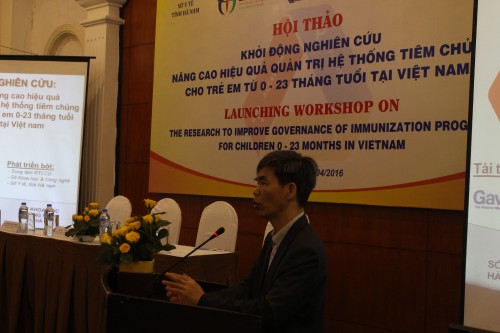
Dr. Tran Tuan (Director of RTCCD) had oppening speech
Through media, assessment reports, experts’ analysis and people’s comments, some hypotheses are provided to explain the reasons for these shortages: Lack of transparency in information dissemination and quality management system does not meet expectations, especially the lack of independent assessment of serious complications after vaccination; Lack of monitoring immunization’s finance; Lack of policies and effective strategy to control the price of vaccination service; and MoH’s approaches to operate and manage the EPI programme seem to be forced.
This study gains supports from MoH’s agencies, universities and international organizations especially WHO office in Hanoi. Delegates gave opinions about the protocol as well as raised questions for the Principle investigator. These questions concentrated on the study’s implementation and shortages in immunization program for children from 0- 23 months in Vietnam.
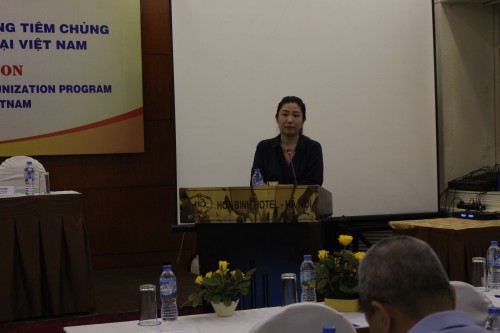
Dr. Makiko Iijima, technical officer of the immunization programme of WHO
Dr. Makiko Iijima, technical officer of the immunization programme of WHO expressed her support for RTCCD’s study. She said: “In Vietnam, there are differences among regions, EPI has been successful in eliminating infectious diseases for children in urban areas but how can it implement effectively in remote areas. WHO understands this difficulty”. Dr. Makiko thinks this study provided policy information that helped bring opportunities for children who could not reach vaccination before. The representative of WHO expects support from government agencies for RTCCD’s study.
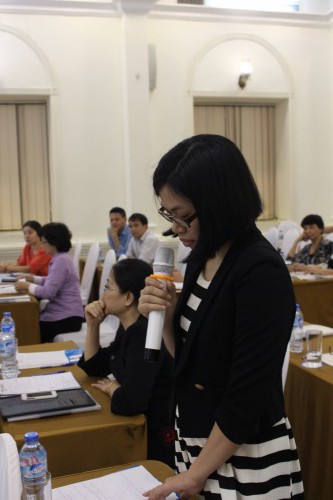
Mrs. Nguyen Thi My Hanh, Representative of General Department of Preventive Medicine (MoH)
Mrs. Nguyen Thi My Hanh- Representative of General Department of Preventive Medicine (MoH)
Mrs. Nguyen Thi My Hanh- Representative of General Department of Preventive Medicine (MoH) expressed her wish to collaborate with RTCCD in implementing this study. .
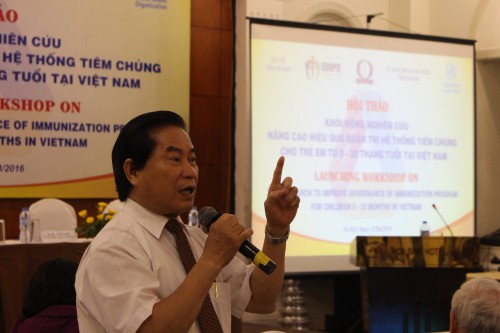
Dr. Nguyen Trong An- Vice director of RTCCD
Dr. Nguyen Trong An, Vice Director of RTCCD said: “This study is independent, an objective judgment and not funded by government so it is different from General Department of Preventive Medicine’s one which conducts one in every 5 years. RTCCD’s study helps avoid the situation of “to be judge in one’s own case” because MoH is the one who bids sand preserves vaccines, screens before vaccination, conducts the process of vaccination, conducts autopsy after causality, and releases causes of these causalities. This exclusiveness leads to a lack of objectiveness and transparency within the system. This study is to support MoH to enhance the effectiveness in governance of Immunization in Vietnam”.
Responding to the delegates’ wonders about Ha Nam Province cannot be representative for the whole immunization program in Vietnam, and the study has to be implemented in different regions to provide appropriate results. Dr. An believes that Vietnam has a single process of immunization therefore the process in Ha Nam is the same as in other provinces. This is the preliminary study for next ones to provide the recommendations for improving the system, and ensuring the vaccine safety for Vietnamese children.
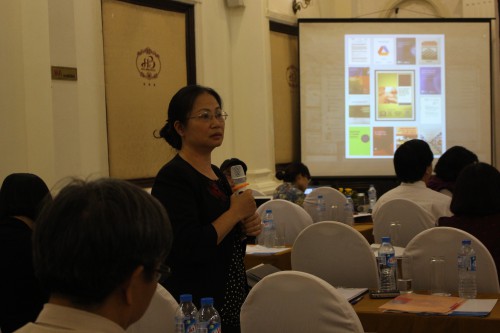
Mrs. Dang Thi Kim Hanh – Head of Disease Control Office (Hanoi Centre of Preventive Medicine)
Mrs. Dang Thi Kim Hanh – Head of Disease Control Office (Hanoi Centre of Preventive Medicine) expressed her support as officers directly governance the immunization in Vietnam: “Before the results of the study are released, media should help the government, MoH and scientists orientate the public and do not make them lose more faith in EPI. I am glad this study is implemented in time to relieve the anxiety of people.
RTCCD and other agencies implementing this study expect the study’s outcomes will be used by the Ministry of Health to develop the strategy to integrate the immunization program for children below 24 months in an essential health package covered by Health Insurance in 2018. This step will become the basis to form Law of immunization or Law of Preventive medicine (including contents about immunization).
Here are some photos from the o Launching workshop:
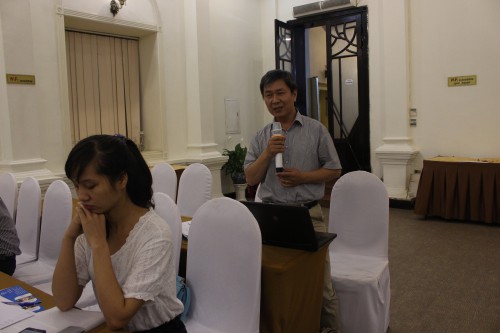
Prof. Tran Huu Bich- Vice Principal of University of Public health
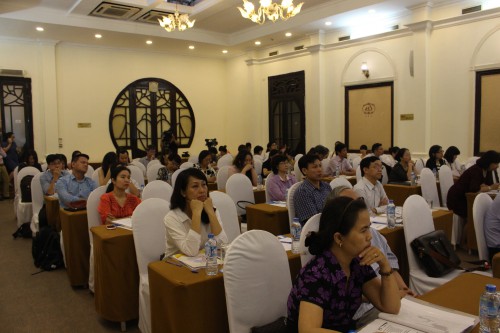
Workshop hall
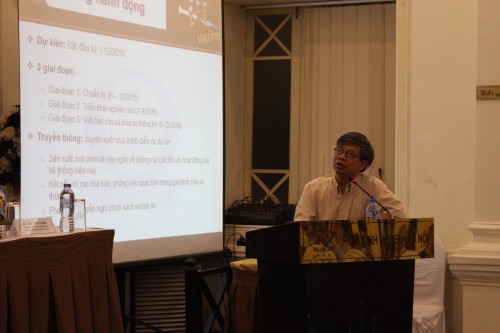
Dr. Van Tat Pham, Vice director of Hanam Department of Health
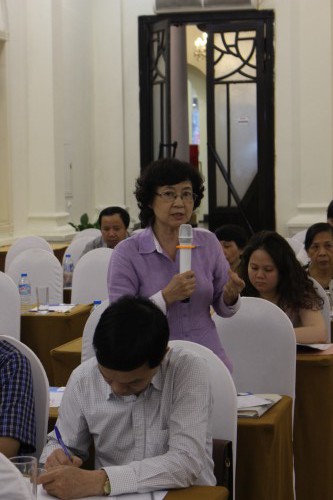
Prof. Nguyen Bach Ngoc, Dean of Faculty of Public Health – Thang Long University
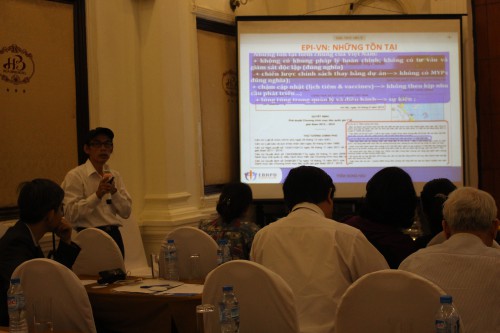
Dr. Tran Song Hao, immunization expert
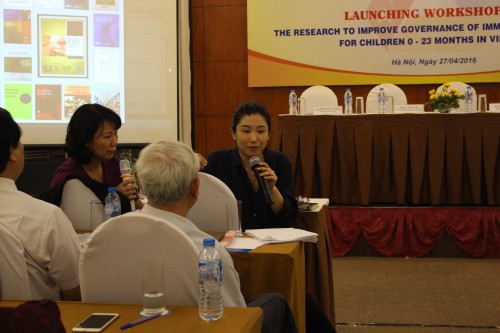
Dr. Makiko Iijima